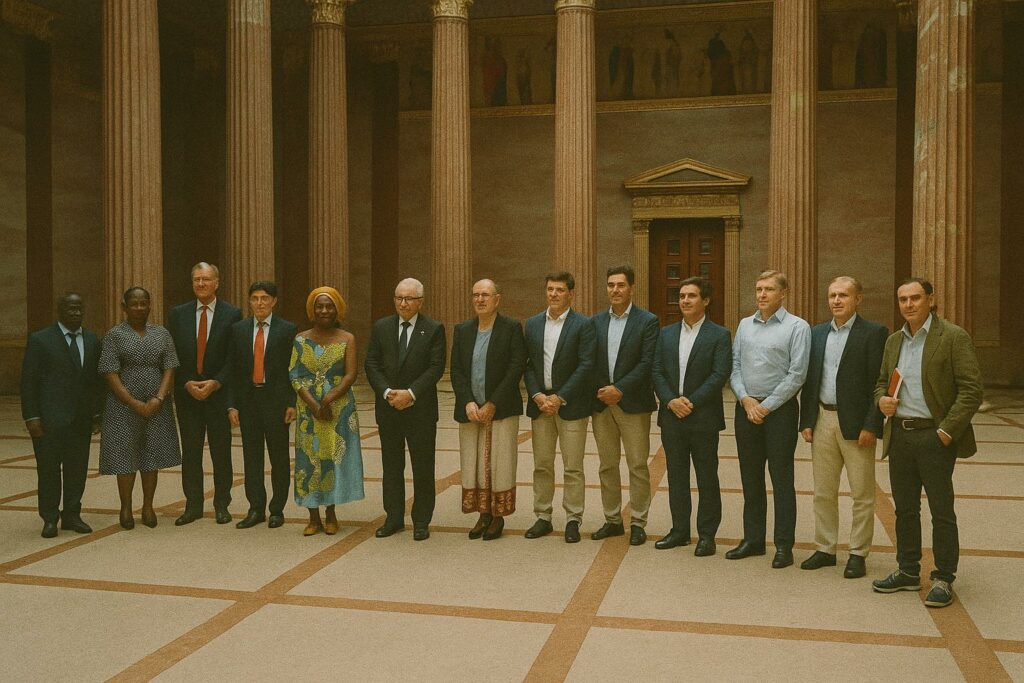Diplomatic Overture in the Heart of Europe
The arrival in Vienna of Jean-Marc Thystère-Tchicaya and Rosalie Matondo, flanked by Ambassador Édith Itoua, signalled more than a routine investment road-show. Vienna’s Hofburg, long accustomed to discreet shuttle diplomacy, hosted a ceremony in which the Congolese cabinet members and the Austrian venture ASC Impact initialed protocols covering an eventual multibillion-euro package for forestry, agro-industry and a new enclave within the Special Economic Zone (SEZ) of Oyo-Ollombo. Former Federal President Heinz Fischer and former agriculture minister Elisabeth Köstinger offered political imprimatur, underscoring Austria’s desire to project climate leadership beyond the EU’s eastern frontier.
A Green Industrial Gamble Beyond Oil Dependence
Since oil prices plunged in 2014, Brazzaville has tried—so far with mixed success—to diversify an economy where hydrocarbons still account for roughly 60 % of GDP and 80 % of exports (Congo Ministry of Planning 2022). The envisioned SEZ extension promises 100 million € for reforestation and ‘several hundred millions’ for industrial processing plants—sawmills, veneer lines and a pulp-and-paper complex. Officials tout as many as 8 000 direct jobs, though no feasibility study has yet been published. For President Denis Sassou-Nguesso, whose mandate emphasises “industrialisation verte”, the partnership offers a narrative of climate-compatible growth that might ease pressure from international creditors wary of Congo’s 103 % debt-to-GDP ratio (IMF 2023).
Carbon Credits and the Political Economy of Climate Finance
The most coveted revenue stream lies not in timber or pulp but in the fungible commodity of forest carbon. Under Article 6 of the Paris Agreement, plantations could generate millions of tonnes of certified emission reductions, potentially fetching 25–40 US$ per unit on voluntary exchanges (UNFCCC 2022). ASC Impact’s local affiliate, Aforest-Congo, hopes to bundle credits into a platform attractive to corporate emitters chasing net-zero pledges. Yet the volatility of carbon markets, illustrated by a 35 % price slump in early 2024 (Bloomberg 2024), raises doubts about long-term cash flow. Moreover, civil-society groups in Brazzaville recall earlier ventures where carbon proceeds bypassed local communities, fuelling mistrust toward concessionary deals.
Austria’s Strategic Calculus: Niche Leadership in Forestry Innovation
For Austria, whose timber cluster around Styria and Carinthia already exports sawnwood to Asia, the Congo accord provides a laboratory to demonstrate satellite-based monitoring, low-emission saw-milling and cellulose chemistry. Vienna’s 2030 Bioeconomy Strategy explicitly seeks “partnerships with tropical countries to secure sustainable feedstock” (Austrian Federal Chancellery 2023). By leveraging development-finance instruments from the Oesterreichische Kontrollbank, Austrian firms may underwrite equipment sales while claiming ESG credentials. Diplomats also note the soft-power dividend: positioning Austria as a mediator in the fractious North-South debate over loss-and-damage funding ahead of COP29.
The Governance Puzzle: Transparency, Land Tenure and Local Consent
All flamboyant projections hinge on governance fundamentals that have felled prior megaprojects in the Congo Basin. Land tenure remains opaque; customary rights often clash with state concessions, as documented in the Mokabi and Ngombé conflicts (FAO 2021). The signed protocols refer to ‘terres concédées par l’État’, yet do not specify mechanisms for prior informed consent or benefit sharing. Vienna-based NGOs such as Fern and Südwind have already urged Austrian lawmakers to condition export credit guarantees on rigorous Free, Prior and Informed Consent standards. Minister Matondo, questioned by journalists in Vienna’s Diplomatic Academy, pledged to publish an environmental-social impact assessment “within six months”, a timeline observers deem ambitious.
Prospects and Caveats for a South-North Climate Partnership
The Oyo-Ollombo venture exemplifies the shift from aid to blended finance that now dominates climate diplomacy. If successful, it could anchor Congo’s move up the value chain while providing Austria with carbon offsets and export receipts. Yet success hinges on disciplined project management, transparent revenue allocation and an international carbon market still in regulatory flux. European lawmakers are debating the Carbon Border Adjustment Mechanism’s extension to embedded deforestation risks, a move that could either reward compliant exporters or penalise laggards. In Vienna, negotiators exuded confidence; in Brazzaville, seasoned diplomats counsel sobriety. As one Congolese official whispered in the margins of the signing ceremony, “Trees grow slowly; expectations grow faster.”

